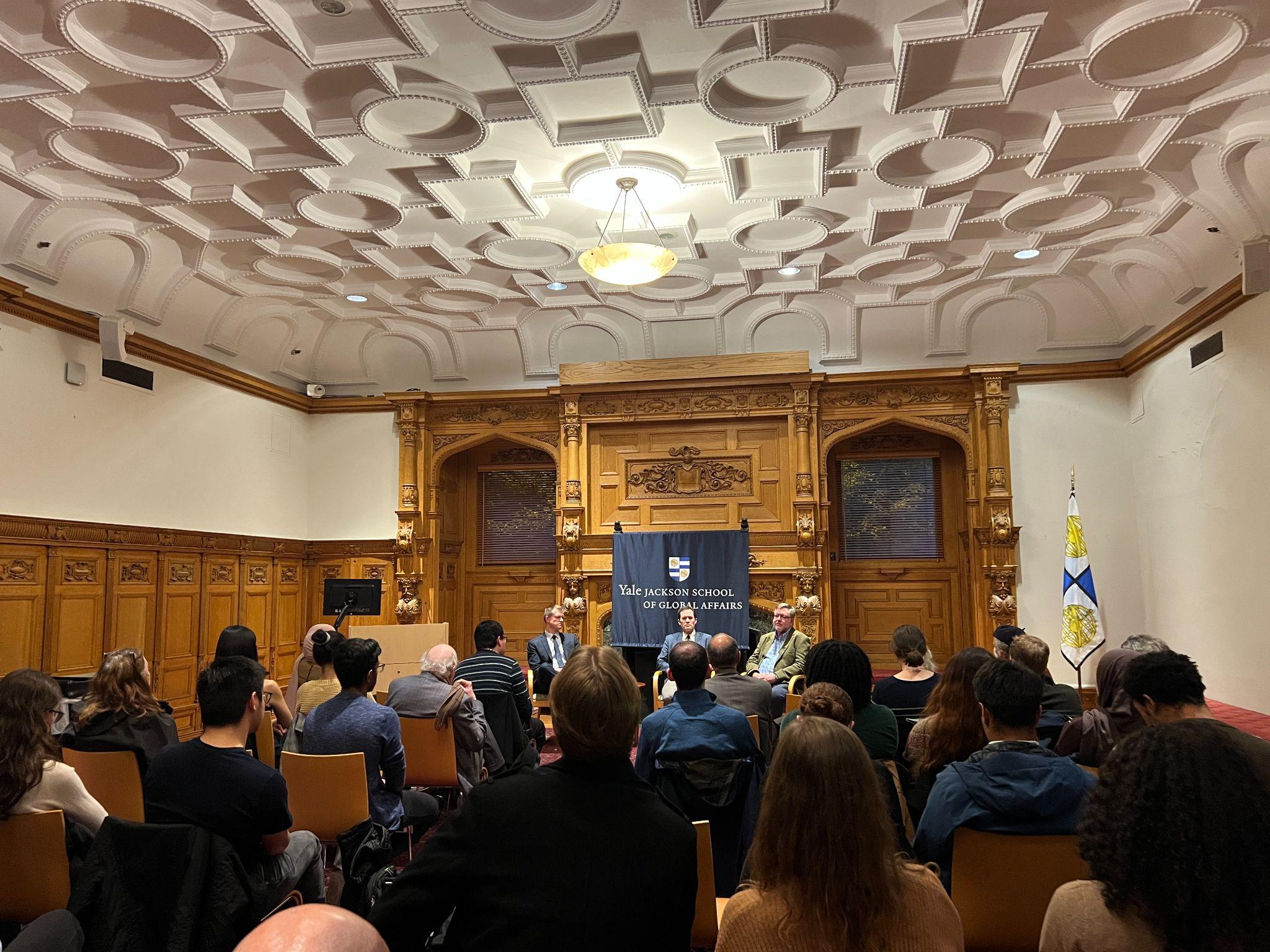John Delury demystifies US-China relations in new book about Yale prisoner of war
At a Monday talk at the Jackson School of Global Affairs, author John Delury discussed his recent book and US-China relations with Yale professors.

Adnan Bseisu, Contributing Photographer
When East Asia scholar John Delury ’97, M.A.’03, Ph.D.’07 stumbled across the obituary of John T. Downey ’51 in 2014, he could not believe he had not heard of him.
Downey was a CIA operative captured by China during a rescue mission and held as a prisoner of war for over 20 years. He and Delurey overlapped in their time in New Haven, where Downey was a judge in his later years.
On Monday, Oct. 24, the Jackson School of Global Affairs invited Delury back to Yale to discuss his recent book “Agents of Subversion” with Elihu Professor of History Arne Westad. In the book, Delury uses the biography of Downey as a reference point to discuss the history of subversion in Sino-American relations during the Cold War.
“[The book] is not about [Downey] as an individual,” Delury said. “It’s more about his arc and all the things around him … it’s basically trying to answer: how did he end up on that plane? He didn’t choose the mission, it was given to him.”
Delury told the audience that while he was initially intrigued by Downey’s story, he realized over the course of his initial research that he was more interested in the political circumstances that led Downey to board the plane that was shot down by China in November 1952.
Delury pointed out that using Downey as a launch point to investigate Sino-American relations at the time made for “a sort of strange structural quirk” in the writing of the book, where Downey is only introduced to the reader for the first time on page 189.
Lasse Van Den Berg ’26, who is studying Chinese at Yale and has lived in China, said he was keen to read Delury’s book because of its unique approach to Unite States-China relations as a historical account.
“It’s exciting to see how the life of one man makes for an appropriate framework to explain the complexity of Sino-American relations,” Van Den Berg said in an interview with the News. “In a fascinating way, the recent history of these two countries is embedded in this individual’s fate.”
The talk, moderated by Michael Brenes, interim director of the Brady-Johnson Program in Grand Strategy and lecturer in history, also focused on the broader U.S.-China relationship leading up to and after 1952.
Westad explained that the Communist victory in the Chinese revolution of 1949 took the US and its allies by surprise.
“There was this tremendous shock, which I think is the only way it can be described, over the Chinese Communist Party, the CCP, taking power,” Westad said. “And that set off what can only be described … as a set of scares –– a deep uncertainty about whether US society was up to this Cold War competition with the Soviet Union and with China.”
Westad and Delury discussed a series of covert operations by the U.S. to gain intelligence on Mao Zedong’s communist regime during the Korean War and in the decades leading up to 1979, when the two countries officially established diplomatic relations with each other.
Westad noted that while the U.S. and China were not formally speaking to one another during this time period, each remained intensely focused on gathering intelligence on the other side.
“There is a kind of remarkable degree of interaction in terms of fears –– in terms of being afraid of what the other side is going to do,” Westad said.
Van Den Berg was most surprised by the scholars’ discussion of the so-called “Third Force,” a group of intellectuals who were armed by the U.S. after the loss of Chiang Kai-shek’s Nationalist Party in the civil war.
Both Westad and Delury acknowledged that the United States did not expect arming these intellectuals to be very effective in resisting Mao. Westad cited theories that U.S. support of the Third Force was aimed to generate much-needed positive domestic propaganda given the unpopularity of the Korean War, while Delury said it came down to “an element of desperation.”
At the end of the talk, the scholars briefly discussed how Delury’s book can provide insights into the tension in current US-China relations.
Delury warned against the efforts of recent U.S. administrations to decouple from China, citing security concerns.
“From an intelligence perspective, there’s a pretty strong case that decoupling is a mistake,” Delury said. “And that we will then make major political and strategic mistakes because we don’t understand who and what we’re dealing with. So [Downey’s story] I think is another, sort of, cautionary lesson.”
Downey joined the CIA in the spring of his senior year at Yale and became the longest-held prisoner of war in American history.







